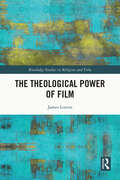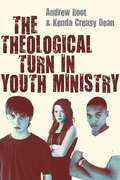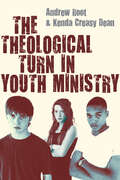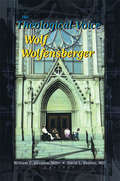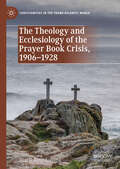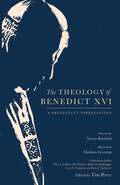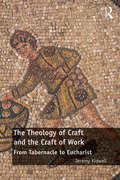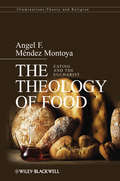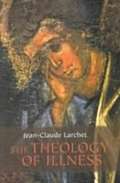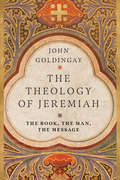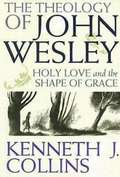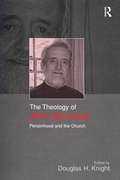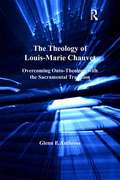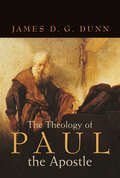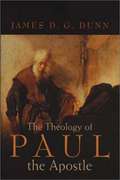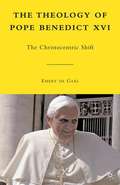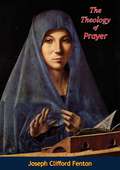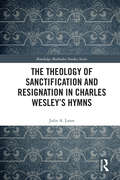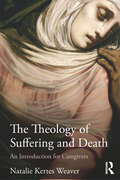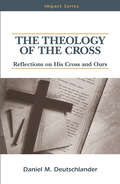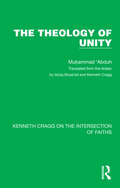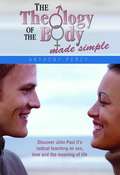- Table View
- List View
The Theological Power of Film (Routledge Studies in Religion and Film)
by James LorenzThis book explores the theological power of film and seeks to render a properly theological account of cinematic art. It considers: What theology and theological practice does cinematic art give rise to? What are the perceptual and affective potentials of film for theology, and what, if anything, is theological about the cinematic medium itself? The author argues that film is a fundamentally embodied art form, a haptic and somatic medium of perception-cum-expression. This, combined with the distinct temporal aesthetic of film, invests cinema with profound theological potentials. The chapters explore these potentials through theological-cinematic analysis, emphasising the themes of encounter, embodiment, time, and contemplation, as well as three intimately connected doctrines of Christian theology: creation, incarnation, and eschatology. Throughout the book, the films and writings of the Russian director Andrei Tarkovsky emerge as a singular illustration of the theological power of film, becoming a crucial resource for theologicalcinematic analysis.
The Theological Turn In Youth Ministry
by Kenda Creasy Dean Andrew RootWhat haunts your youth group? So often we avoid talking about doubts and fears because we feel inadequately equipped to address them in any meaningful way. The crisis of existence can't be answered with pat Sunday school formulas or a few Bible verses, let alone another relay race. The questions our youth have are often the same ones that perplexed the great theologians, driving them to search for God in the places God didn't appear to be—places of brokenness, suffering and confusion. What if we let these questions drive our search for God too? Andrew Root and Kenda Creasy Dean invite you to envision youth ministries full of practical theologians, addressing the deep questions of life with a wonderfully adolescent mix of idealism, cynicism and prophetic intolerance for hypocrisy. Follow them into reflection on your own practice of theology, and learn how to share that theology through rich, compassionate conversation and purposeful experience.
The Theological Turn in Youth Ministry
by Kenda Creasy Dean Andrew RootChristianity TodayWhat haunts your youth group?The questions our youth have are often the same ones that perplexed the great theologians, driving them to search for God in the places God didn't appear to be--places of brokenness, suffering and confusion. What if we let these questions drive our search for God too?Andrew Root and Kenda Creasy Dean invite you to envision youth ministries full of practical theologians, addressing the deep questions of life with a wonderfully adolescent mix of idealism, cynicism and prophetic intolerance for hypocrisy. Follow them into reflection on your own practice of theology, and learn how to share that theology through rich, compassionate conversation and purposeful experience.
The Theological Voice of Wolf Wolfensberger
by William C Gaventa David CoulterDo people with mental retardation have a special prophetic role?In the field of developmental disabilities, Wolf Wolfensberger is famous for his seminal book Normalization. But Wolfensberger is also a theologian, and the two strands of his thought are inextricable. The Theological Voice of Wolf Wolfensberger showcases his theories on the spiritual meaning of mental retardation and other disabilities.Up until now, Wolfensberger's work has been available only in small, hard-to-find publications, mostly in the field of human services. Thus his theological perspectives have not yet been heard in many religious circles. The Theological Voice of Wolf Wolfensberger brings together his essays and presentations from the past thirty years, giving the reader a unique pathway into his pioneering ideas on the spiritual implications of developmental disabilities. In addition, the volume includes critiques of his thought by several noted scholars and practitioners, along with Wolfensberger's response to those critiques.The Theological Voice of Wolf Wolfensberger expresses powerful opinions, some outrageous, all courageous. You will find yourself intently engaged with his provocative theories, including: why installing wheelchair access ramps may actually block full participation of the handicapped in the life of the church how the “deathmaking” culture of the modern world prevents Christians from understanding the meaning of suffering why people with mental retardation are the prophets of our times why most Christians ignore the powerful Biblical call to communality which special gifts of grace people with mental retardation may possess how handicapped and societally devalued patients can be protected from the neglect (or worse) of hospital staff The Theological Voice of Wolf Wolfensberger is challenging, inspiring, and sometimes infuriating. It is bound to stir up controversy among health care professionals, disability advocates, and anyone concerned with spiritual matters. You may not agree with Wolfensberger, as some of the contributors to this volume do not, but he will make you think . . . hard.
The Theology and Ecclesiology of the Prayer Book Crisis, 1906–1928 (Christianities in the Trans-Atlantic World)
by Dan D. CruickshankThis book considers the doctrinal and ecclesiological trends that were present during the construction of the revised Book of Common Prayer of 1927. Through the use of the records of both Convocations and of the National/Church Assembly, it examines the debates that led to the revised Book and the doctrinal shifts that were present in these debates. It challenges the idea that the revision process stalled in the First World War by showing how the birth of the National Assembly that took place during the war was born out of the revision process. Through the Assembly records it shows the integral role the laity played in the revision process. It examines the attempts to get the revised Books through Parliament, the difference between pro and anti-revision speakers, and the radical ecclesiological thinking that followed the rejections.
The Theology of Augustine’s Confessions
by Paul RigbyThis study of the Confessions engages with contemporary philosophers and psychologists antagonistic to religion and demonstrates the enduring value of Augustine's journey for those struggling with theistic incredulity and religious narcissism. Paul Rigby draws on current Augustinian scholarship and the works of Paul Ricœur to cross-examine Augustine's testimony. This analysis reveals the sophistication of Augustine's confessional text, which anticipates the analytical mindset of his critics. Augustine presents a coherent, defensible response to three age-old problems: free will and grace; goodness, innocent suffering, and radical evil; and freedom and predestination. The Theology of Augustine's Confessions moves beyond commentary and allows present-day readers to understand the Confessions as its original readers experienced it, bridging the divide introduced by Kant, Hegel, Freud, Nietzsche, Heidegger, and their descendants.
The Theology of Benedict XVI: A Protestant Appreciation
by Tim PerryGod's rottweiler or shepherd of the faithful? There's no doubt about Benedict XVI's theological legacy. He's been at the center of every major theological controversy in the Catholic Church over the last fifty years. But he remains a polarizing figure, misunderstood by supporters and opponents alike. A deeper understanding of Benedict's theology reveals a man dedicated to the life and faith of the church. In this collection of essays, prominent Protestant theologians examine and commend the work of the Pope Emeritus. Katherine Sonderegger, Kevin Vanhoozer, and Carl Trueman—among others—present a full picture of Benedict's theology, particularly his understanding of the relationship between faith and reason and his pursuit of truth for the church. The global Christian faith can learn from Benedict's insight into the modern church and his desire to safeguard the future of the church by leaning on the wisdom of the ancient church. Contributors: Tim Perry Ben Myers Katherine Sonderegger Gregg R. Allison Kevin J. Vanhoozer R. Lucas Stamps Christopher R. J. Holmes Fred Sanders Carl R. Trueman David Ney Peter J. Leithart Joey Royal Annette Brownlee Preston D. S. Parsons Jonathan Warren P. (Pagán)
The Theology of Craft and the Craft of Work: From Tabernacle to Eucharist
by Jeremy KidwellAn important reconceptualisation is taking place in the way people express creativity, work together, and engage in labour; particularly, suggests Kidwell, a surprising resurgence in recent years of manual and craft work. Noting the wide array of outlets that now market hand-made goods and the array of popular books which advocate ‘making’ as a basis for activism or personal improvement, this book seeks to understand how the micro-politics of craft work might offer insights for a broader theology of work. Why does it matter that we do work which is meaningful, excellent, and beautiful? Through a close reading of Christian scripture, The Theology of Craft and the Craft of Work examines the theology and ethics of work in light of original biblical exegesis. Kidwell presents a detailed exegetical study of temple construction accounts in the Hebrew bible and the New Testament. Illuminating a theological account of craft, and employing the ancient vision of ‘good work’ which is preserved in these biblical texts, Kidwell critically interrogates modern forms of industrial manufacture. This includes a variety of contemporary work problems particularly the instrumentalisation and exploitation of the non-human material world and the dehumanisation of workers. Primary themes taken up in the book include agency, aesthetics, sociality, skill, and the material culture of work, culminating with the conclusion that the church (or ‘new temple’) is both the product and the site of moral work. Arguing that Christian worship provides a moral context for work, this book also examines early Christian practices to suggest a theological reconceptualisation of work.
The Theology of Food: Eating and the Eucharist (Illuminations: Theory & Religion #10)
by Angel F. Méndez-MontoyaThe links between religion and food have been known for centuries, and yet we rarely examine or understand the nature of the relationship between food and spirituality, or food and sin. Drawing on literature, politics, and philosophy as well as theology, this book unlocks the role food has played within religious tradition. A fascinating book tracing the centuries-old links between theology and food, showing religion in a new and intriguing light Draws on examples from different religions: the significance of the apple in the Christian Bible and the eating of bread as the body of Christ; the eating and fasting around Ramadan for Muslims; and how the dietary laws of Judaism are designed to create an awareness of living in the time and space of the Torah Explores ideas from the fields of literature, politics, and philosophy, as well as theology Takes seriously the idea that food matters, and that the many aspects of eating – table fellowship, culinary traditions, the aesthetic, ethical and political dimensions of food – are important and complex, and throw light on both religion and our relationship to food
The Theology of Illness
by Jean-Claude LarchetSt Augustine, from the Latin and Catholic tradition; St John Chrysostom, the Greek and Orthodox tradition; and Martin Luther, the Reformation and Protestant tradition. Together and yet separately, they illuminate both the Sermon and the speaker for anyone who still takes the challenge of faith, and language, seriously.
The Theology of Jeremiah: The Book, the Man, the Message
by John GoldingayHow do we think about the theology of the book of Jeremiah? Do we consider themes section by section, or do we step back and look at the whole? John Goldingay says "both." In The Theology of Jeremiah, Goldingay considers the prophet Jeremiah himself, his individual circumstances and those of Judah, and his message. Though Jeremiah's message varies throughout the book, we gain insights into Jeremiah's theology by viewing the book in its entirety. In doing so, we learn about God, Israel as the people of God, the nature of wrongdoing and prophecy, and what we know about the future.
The Theology of John Wesley: Holy Love and the Shape of Grace
by Kenneth J. CollinsA rich articulation of John Wesley's theology that is appreciative of the old and mindful of the new, faithful to the past and attentive to the present.This work carefully displays John Wesley's eighteenth century theology in its own distinct historical and social location, but then transitions to the twenty-first century through the introduction of contemporary issues. So conceived, the book is both historical and constructive demonstrating that the theology of Wesley represents a vibrant tradition. Cognizant of Wesley's own preferred vocabulary, Collins introduces Wesley's theological method beginning with a discussion of the doctrine of God. "In this insightful exposition the leitmotif of holy love arises out of Wesley's reflection on the nature of the divine being as well as other major doctrines." (Douglas Meeks)
The Theology of John Zizioulas: Personhood and the Church
by Douglas H. KnightJohn Zizioulas is widely recognised as the most significant Orthodox theologian of the last half century and acclaimed advocate of ecumenism. From his indepth knowledge of the intellectual resources of the Church, Zizioulas has argued that the Church Fathers represent a profound account of freedom and community that represents a radical challenge to modern accounts of the person. Zizioulas uses the work of the Fathers to make an important distinction between the person, who is defined by a community, and the individual who defines himself in isolation from others, and who sees community as a threat to his freedom. Zizioulas argues that God is the origin of freedom and community, and that the Christian Church is the place in which the person and freedom come into being. This volume offers a critical appraisal of the theology of John Zizioulas. Leading Anglican, Reformed, Catholic and Orthodox international scholars, including Colin Gunton, Nicholas Loudovikos, Paul McPartlan, Wolfhart Pannenberg and Philip Rosato present essays which analyse Zizioulas' trinitarian doctrine of God, and his theological account of the Church as the place in which freedom and communion are actualised. Many include discussions of Zizioulas' Being as Communion as well as other lesser known works, now available in Communion and Otherness. Together they represent an unrivalled introduction to the work of this great theologian.
The Theology of Louis-Marie Chauvet: Overcoming Onto-Theology with the Sacramental Tradition
by Glenn P AmbroseThe Theology of Louis-Marie Chauvet provides a much needed accessible introduction to the philosophical and theological foundations of Chauvet's sacramental theology. Particular attention is given to his appropriation of Heidegger and use of the Social Sciences to elucidate the nature of the symbolic exchange that lies at the heart of the sacramental tradition. This book highlights the prophetic, deconstructive and even iconoclastic message for contemporary society and the church implicit in the Eucharistic liturgy. Common conceptions of God's presence and sacrifice are critically analyzed and the connection between sacramental worship and ethics is emphasized.
The Theology of Paul the Apostle
by James D. DunnIn this major work, James D. G. Dunn brings together more than two decades of vigorous and creative work on interpreting the letters of Paul into an integrated, full-scale study of Paul’s thought. Using Paul’s letter to the Romans as the foundation for constructing a fuller exposition of Paul’s whole theology, Dunn’s thematic treatment clearly describes Paul’s teaching on such topics as God, humankind, sin, christology, salvation, the church, and the Christian life. In the process Dunn engages in a concise way what other important scholars have said regarding each area of inquiry. The Theology of Paul the Apostle represents a major contribution to the ongoing discussion regarding what Paul’s theology is and what its continuing relevance is to the study and practice of religion and theology.
The Theology of Paul the Apostle
by James D. G. DunnUsing Paul's letter to the Romans as the foundation for his monumental study of Paul's theology, James D. G. Dunn describes Paul's teaching on God, sin, humankind, Christology, salvation, the church, and the nature of the Christian life.
The Theology of Paul's Letter to the Galatians
by James D. G. DunnPaul's Letter to the Galatians is one of the fiercest and most polemical writings in the Bible. That is what makes it, for the author of this study, such an exciting document to deal with. It emerges from the early days of a vigorous new movement (Christianity), when basic principles were first being formulated, and when the whole character of the movement was at stake. In the pages of Galatians we witness fundamental features of Christian theology taking shape before our eyes, where the living heart of Paul's gospel is encountered. For James D. G. Dunn there is an elemental quality about the letter, to which those tired of compromising half-truths are drawn when they feel the impulse to return to first principles. This book, which benefits from this perspective on Paul, explains more clearly than hitherto both the issues which confronted Paul and the powerful theological arguments he brought to bear in response, and casts light on a document still capable of shaping lives and theology today.
The Theology of Pope Benedict XVI
by Emery De GaálMany refer to Pope Benedict XVI as "the Mozart of Theology. " Who are the thinkers who have informed his theology? What events, and which religious devotions, have shaped his personality? This study attempts to shed light on the unifying melody of the policies and positions of a pontificate charged with spiritual and theological depth.
The Theology of Prayer
by Joseph Clifford FentonThe Theology of Prayer, written by one of the twentieth century’s foremost theologians, distills the teachings of Thomas Aquinas, Thomas a Vallgornera, and Joseph a Spiritu Sancto, among other great scholastic theologians, on the nature of Christian prayer, whose writings hold such treasures on praying effectively that their loss would be a tragedy for the people of God.In these pages, Monsignor Fenton clearly and concisely presents to the contemporary reader the scholastics’ works and their insights on Sacred Scripture and Tradition. With The Theology of Prayer, Fenton revitalizes the work of those theologians, preserving their insights and presenting plainly what God has revealed about prayer and how the Church has preserved and expounded that revelation for the good and the salvation of all who believe. “Prayer is something, then, which is instituted, and which is commanded, for our benefit. It tends to make us love God more fully, hope in Him with greater confidence, and serve Him with greater devotion. (Joseph C. Fenton)
The Theology of Sanctification and Resignation in Charles Wesley's Hymns (Routledge Methodist Studies Series)
by Julie A. LunnSanctification is a central theme in the theology of both John and Charles Wesley. However, while John’s theology of sanctification has received much scholarly attention, significantly less has been paid to Charles’ views on the subject. This book redresses this imbalance by using Charles’ many poetic texts as a window into his rich theological thought on sanctification, particularly uncovering the role of resignation in the development of his views on this key doctrine. In this analysis of Charles’ theology of sanctification, the centrality he accorded to resignation is uncovered to show a positive attribute involving acts of intention, desire and offering to God. The book begins by putting Charles’ position in the context of contemporary theology, and then shows how he differed in attitude from his brother John. It then discusses in depth how his hymns use the concept of resignation, both in relation to Jesus Christ and the believer. It concludes this analysis by identifying the ways in which Charles understood the relationship between resignation and sanctification; namely, that resignation is a lens through which Charles views holiness. The final chapter considers the implications of these conclusions for a twenty-first century theological and spiritual context, and asks whether resignation is still a concept which can be used today. This book breaks new ground in the understanding of Charles Wesley’s personal theology. As such, it will be of significant interest to scholars of Methodism and the Wesleys as well as those working in theology, spirituality, and the history of religion.
The Theology of Suffering and Death: An Introduction for Caregivers
by Natalie Kertes WeaverThis book offers a theological foundation for engaging with the realities of suffering and dying. Designed particularly for practical theology students and trainee caregivers, it introduces the spiritual and theological issues raised by suffering and dying. The chapters consider: how Christian theology deals with the problem of suffering and how the Bible treats these difficult issues post-biblical interpretations of Jesus’ suffering and the Cross modern instances including ecology, poverty, discrimination and war comparative religious approaches and the depiction in popular culture. Natalie Weaver relates theology to practical issues of caregiving and provides a ‘toolbox’ for thinking about suffering and death in a creative and supportive way.
The Theology of The Cross: Reflections on His Cross and Ours (Impact Series)
by Daniel M DeutschlanderWhat did Jesus mean when he said, "Take up your cross and follow me?"The Bible teaches that Jesus Christ is the true center of our salvation.Through a deep and powerfully written examination of Scripture, author Daniel Deutschlander demonstrates that without Jesus' sacrifice on the cross, we would be lost. However, because of Jesus' death and resurrection, we now have the promise of eternal life in heaven with him.That changes everything for us!The Theology of the Cross will also remind you that since Jesus first loved you, it is now your joy to take up your own cross daily and follow him. What does that look like for you? This book answers that questions and points you to our Savior's cross, which empowers you to live each day for him.Here's what people are saying about this book:"The theology of the cross is a matter of urgent, practical concern for every Christian. Beginning with the words of Jesus commanding... us to deny ourselves and take up our cross and follow him, Professor Deutschlander shows how the path of self-denial, repentance, difficulty, and struggle is the only place where the gospel reveals its true glory and bears its fruit in our lives." –Professor Joel D. Fredrich, Martin Luther College, New Ulm, Minnesota"This book warns us of Satan's efforts to turn us from Christ to ourselves. It comforts us with the assurance that the cross of Christ leads to heavenly glory." –Professor James F. Korthals, Wisconsin Lutheran Seminary, Mequon, Wisconsin
The Theology of Unity (Kenneth Cragg on the Intersection of Faiths #2)
by Muhammad 'AbduhOriginally published in 1966, this was the first of Muhammad ‘Abduh’s works to be translated into English. Risālat al Tauhid represents the most popular of his discussion of Islamic thought and belief. ‘Abduh is still quoted and revered as the father of 20th Century Muslim thinking in the Arab world and his mind, here accessible, constituted both courageous and strenuous leadership in his day. All the concerns and claims of successive exponents of duty and meaning of the mosque in the modern world may be sensed in these pages. The world and Islam have moved on since ‘Abduh’s lifetime, but he remains a source for the historian of contemporary movements and a valuable index to the self-awareness of Arab Islam.
The Theology of the Body Made Simple
by Anthony PercyThis is a simple introduction to the basic premise of the theology of the body. It explains how our bodies are symbolic, free, meant for love, and redeemed by Christ. It presents unambiguous reasons for the Church's teaching on premarital sex, contraception, homosexuality, pornography, and more. And it gives reason to hope that the love we crave so deeply is, in fact, promised us by God...from the beginning.
The Theology of the Book of Amos
by John BartonIn modern times Amos has come to be considered one of the most important prophets, mainly for his uncompromising message about social justice. This book provides a detailed exploration of this theme and other important elements of the theology underlying the book of Amos. It also includes chapters on the text itself, providing a critical assessment of how the book came to be, the original message of Amos and his circle, which parts of the book may have been added by later scribes, and the finished form of the book. The author also considers the book's reception in ancient and modern times by interpreters as varied as rabbis, the Church Fathers, the Reformers, and liberation theologians. Throughout, the focus is on how to read the book of Amos holistically to understand the organic development of the prophet's message through the many stages of the book's development and interpretation.
